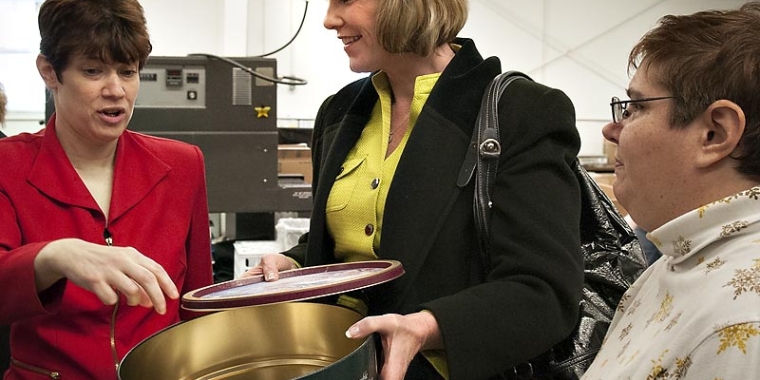
Senator Young Introduces Legislation to Increase Employment Opportunities for People with Developmental Disabilities
Catharine Young
February 27, 2014

For Release: Immediate, February 27, 2014
Senate Bill 6640 Supports Integrated Work Centers for Job Seekers with Developmental Disabilities
ALBANY - Senator Catharine Young (R,C,I - Olean) has introduced legislation that will help New Yorkers with developmental disabilities to keep their current jobs while also creating important employment opportunities for future job seekers.
Recent federal and state announcements have revealed that sheltered workshops employing individuals with developmental disabilities, as they now exist, will close. Senator Young’s bill provides a means for these sheltered workshops to transition into qualified employment centers that can continue to employ people with developmental disabilities, while also providing tax incentives to encourage additional employment.
“Empowering citizens with developmental disabilities to be able to live productive and fulfilling lives is a critically important mission. This bill will help those who wish to work find suitable employment in their communities and achieve the sense of pride, purpose, and self-worth that a secure job can bring. Along with invaluable opportunities for socializing and building relationships, earning one’s own paycheck provides a priceless satisfaction that comes with the feeling of being part of the workforce. We must ensure that members of our community with developmental disabilities do not lose these important employment opportunities,” said Senator Young.
Transitions in programming and services for people with developmental disabilities are currently being considered in reaction to changing federal directives which have the potential to seriously jeopardize the current employment opportunities available to these individuals and compromise the comprehensive spectrum of employment that benefits communities.
“A number of current initiatives and requirements emanating from the Centers for Medicare and Medicaid Services’ new definitions for Home and Community Based Medicaid Waiver services, as well as efforts to comply with the U.S. Supreme Court’s Olmstead decision, may very soon cause devastating, unintended consequences for individuals with intellectual and developmental disabilities in New York State,” explained Paul Cesana, CEO and Executive Director of The Resource Center, which supports individuals with disabilities.
“These will de facto eliminate options developed over the past decades that provide opportunities for meaningful community participation and paid employment, without offering any real improved alternative. This will negatively impact thousands of New York State residents and their families who have relied on work centers’ paid employment experiences as part of their daily routine to meet their personal needs, their exploration and pursuit of other options such as supported and competitive employment, and their overall aspirations.
“That’s why Senator Young’s proposed legislation is the first critical legislative effort in our state to bring to the forefront the necessity of finding creative, but tangible, alternatives that preserve the quality of life for individuals with intellectual and developmental disabilities, and of their families. We applaud the Senator for her efforts,” said Mr. Cesana.
Existing programs and sheltered workshops are confronted with an uncertain future without changes. Already, since July 2013, providers have been prevented from being able to make any new hires. Coupled with the serious financial situation faced by many, their ability to provide developmentally disabled citizens with valuable employment, socialization, and skill development opportunities is becoming significantly hindered.
In response, Senator Young is making the case for the tremendous benefits that these safety net employment programs have on many individuals and communities.
Senator Young’s bill would require the Commissioner of the Office for People with Developmental Disabilities (OPWDD) to provide guidance to current providers regarding transitioning into approved, qualified entities, ensuring that their doors can remain open and important community job opportunities for developmentally disabled employees are preserved.
The bill would also provide tax credits to providers making the transition into these qualified entities, as well as other businesses who hire employees with intellectual and developmental disabilities.
Current programs provide special needs and disabled individuals with meaningful and rewarding work doing activities such as assembling products, packaging items, sowing, and other necessary tasks that match an employee’s capabilities.
Wayne and Elaine Hotelling of Silver Creek, New York, know firsthand how important sheltered workshops are. Their 51-year-old daughter, Laurel, has participated in one of The Resource Center’s sheltered workshops for almost 30 years and currently works at the Mary Andrews Center in Dunkirk.
“Without the center, I don’t know what she would have done,” said Elaine Hotelling. “It has been very important for her to work at the workshop. Being able to get a paycheck every week just like everyone else has been very important. She has her friends there, and they bring home that paycheck and it’s their own money that they worked for. There’s a feeling of success there.”
Wayne Hotelling added, “She has blossomed as a person. This work center has been her life and she has done so many things that we never had any idea she would be capable of doing. She and her friends are contributing members of our society and they have done so much for people with special needs and disabilities.”
Significant transportation challenges for employees would also result if the sheltered workshops were lost, especially in rural and geographically isolated regions of the state where there is a lack of available alternative opportunities and transportation options that residents with developmental disabilities rely on.
“Our community is very rural so here we would have a problem if the workshop closes and everyone has to try to find jobs out in the public domain. That is a big problem, as well as the fact that already high unemployment figures mean the people at the workshops, if they lose their jobs, are going to have to get at the end of the line behind all the other unemployed,” said Elaine Hotelling.
In addition to The Resource Center, statewide and other local Arc organizations have also joined Senator Young in calling for necessary changes.
“NYSARC strongly supports this legislation. It ensures that people with developmental disabilities will continue to be productively engaged with minimum disruption while complying with state and federal mandates for integrated employment appropriate to the needs of each individual. It is a deliberate and careful approach that will greatly reassure thousands of families across the state. We are deeply appreciative of Senator Young’s efforts on this important issue,” said Marc N. Brandt, Executive Director at NYSARC, Inc.
Chris Peterson, Executive Director at the Arc of Livingston-Wyoming, said, “Senator Young visited the Arc of Livingston-Wyoming in November 2013 and met with self advocates, parents, board members and staff. At that meeting, she listened to people employed at Hilltop Industries and promised to submit legislation to preserve an employment safety net. True to her word, she has done that.
“People have many different abilities and for years Arc's across New York have supported people working and enjoying their communities using their abilities. Then and now, we continue to promote integration in all aspects of life. The Senator’s legislation not only preserves an employment safety net, but goes beyond to incentivize employers to hire through tax credits and improve transportation coordination so that people can get to work. This legislation is a common sense approach that leaves no one out in the cold while improving opportunities for employment,” said Mr. Peterson.
Mari Howard, CEO at the ReHabilitation Center in Olean, New York, said, “As substantial policy changes on the federal and state levels seek to effectively restrict opportunities for people with disabilities, this proposed legislation instead seeks to pave the way for the more effective creation of employment opportunities.
“The Senator has demonstrated her appreciation for the significant barriers to employment faced by people with intellectual and developmental disabilities and their families. Some of these barriers – such as transportation – are exacerbated by the fact that we are a large, rural county at the northernmost reaches of Appalachia. Just one such barrier can prevent individuals from reaching successful outcomes.
“We applaud Senator Young for recognizing the sense of pride and self-worth our citizens get from working and thank her for proactively working to insure that work opportunities remain available to each New Yorker, regardless of where he or she lives or what level of disability they face,” said Ms. Howard.
Mike Damiano, CEO at Allegany Arc, said, “Allegany Arc wishes to express its gratitude to Senator Catharine Young for her introduction of legislation that will help New Yorkers with intellectual and developmental disabilities keep their current jobs while also creating important employment opportunities in the future. While Allegany Arc continues to support some workers with disabilities in sheltered workshops, many others are working at competitive, integrated jobs at businesses in our community, including affirmative businesses sponsored by our agency. These achievements are at risk of being undercut by a climate of uncertainty. The Senator’s legislation sends a loud and clear message to these workers and their families, ‘Somebody in Albany still cares about you!’
“During the past few years, conflict between the New York State Office for People with Developmental Disabilities and the Centers for Medicare and Medicaid Services has left many New Yorkers with intellectual and developmental disabilities and their families fearful and uncertain about their futures. Families hear about the Front-Door initiative, mandatory managed care, new needs assessments, closing sheltered workshops, reducing day habilitation services, etc. While some of these changes may improve supports for people with intellectual and developmental disabilities and make the system more sustainable, we believe strongly that it would be irresponsible to abandon the current system of supports and services, prior to evaluating the efficacy of the proposed models.
“Allegany Arc looks forward to discussing this important piece of legislation with the Senator and to sharing it with our staff members, Board of Directors, the people we serve, and their families. We expect that this legislation will serve as an example of how government can be effective when leaders like Senator Young sponsor responsible, common sense legislation that builds on the success of the past while improving services to citizens and making them more sustainable,” said Mr. Damiano.
###
Share this Article or Press Release
Newsroom
Go to Newsroom
Chautauqua County Soldier Posthumously Honored
October 1, 2018
Senator Young Honors Chautauqua County Hero
September 28, 2018